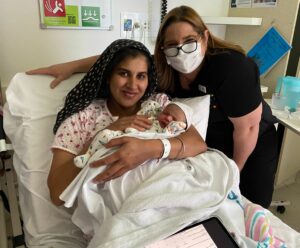
NWMPHN is proud to support Generation Victoria (GenV), a research project led from the Murdoch Children’s Research Institute that aims to improve long-term health and wellbeing for children and parents.
GenV is one of the world’s largest ever studies of its kind that is happening in maternity hospitals and services across Victoria. The opt-in project will follow babies and their parents to help solve problems like asthma, food allergies, obesity, and mental illness – mostly using data that is already routinely collected.
GenV want to learn how ethnicity, culture and language impact on children’s health and wellbeing. Committed to its principle of inclusivity, GenV is open to every Victorian family with a newborn baby over a two-year period (2021-2023), no matter where in Victoria they live, who they are or what language they speak.
Many research projects lack the resources to factor in measures that are inclusive of all population, often excluding families from non-English speaking backgrounds. As such GenV is particularly important for groups often missed in public health research. This approach has seen participants who speak 53 different languages join GenV to-date. The project now has more than 1,600 participants whose primary language spoken at home is not English.

GenV participant information and explainer videos are offered in six languages: English, Arabic, Burmese, Punjabi, Simplified Chinese and Vietnamese.
GenV aims to address inequities in population health outcomes by building a cohort representative of the Victorian population, including families living in regional and rural areas, culturally and linguistically diverse (CALD) communities and Aboriginal and Torres Strait Islander peoples. This will give a complete picture of the health and wellbeing of a whole generation and generate translatable evidence — including prediction, prevention, treatments and services — to improve future wellbeing and reduce the future disease burden of all children and the adults they become.
Learn more: Information for health professionals or fast facts to help explain GenV.




